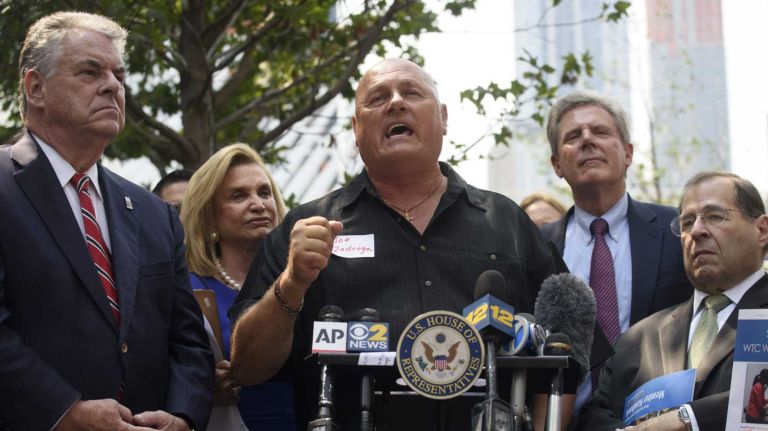
On the 14th anniversary of the worst terrorist attack against the U.S. in history, many first responders are pleading for the continuation of a program that pays for injuries sustained while responding to the call of duty and the illnesses they developed afterward.
Some first responders and survivors will be forced to re-mortgage, and may even lose, their homes if the Zadroga Act, is not extended, said Carol Paukner, 50, a retired NYPD officer who suffered a torn rotator cuff and neck, foot, knee and eye injuries in the World Trade Center attacks and was diagnosed with lymphatic leukemia last year.
“People will go bankrupt,” said Paukner, who lives in Miller Place, Long Island. “One trip to Sloan Kettering is $15,000.”
The Zadroga Act’s $1.6 billion health care and monitoring effort for responders and survivors is set to expire in October, while the $2.75 billion the Sept. 11th Victims Compensation Fund ends in October 2016.
That would leave more than 70,000 responders and survivors of the attacks — most of whom live in the tri-state area — without the medical care and financial support for injuries suffered then and illnesses that are continuing to develop from what they believe to be exposure to a toxic, smoky cocktail of pulverized glass, gas, metals and plastics.
So far, 4,385 cancers have been detected in 9/11 responders and survivors, according to the Centers for Disease Control. Others have been diagnosed with autoimmune disorders, asthma, obstructive pulmonary disease, and gastroesophageal reflux disease.
The clinics that popped up to cater to victims of the 9/11 attacks — there are 17 in and around NYC — would also close.
“If the clinic isn’t there, I’m in big trouble: I stay in New York because of these benefits,” said Paukner, who retired in 2004. “We all have symptoms — prostate, esophageal and stomach cancer, the leukemias.”
In April, Rep. Carolyn Maloney sponsored the James Zadroga 9/11 Health and Compensation Reauthorization Act in the house with broad bipartison support locally.
Maloney and others, including reps Peter King and Jerrold Nadler, are using the 9/11 anniversary as an occasion for a public relations blitz to prod a polarized, balkanized Congress to take action.
In the Senate, the bill was introduced by Democratic senators Kirsten Gillibrand, Charles Schumer, both of New ork,. and Republican senators Lisa Murkowski, of Alaska and Mark Kirk, of Illinois.
But opposing the bill “is not a winning issue,” said Republican strategist and pollster John McLaughlin, noting that Republicans are intent on killing the Iran bill and penalizing “the people who responded to the greatest terrorist attack in the U.S. would make very poor public advocacy.”
But aren’t Republican politicians from other parts of the country stonewalling the legislation? “I haven’t found anybody who is opposed to it,” McLaughlin said.
Opposition is more tacit than explicit, explained a Democratic congressional spokesman on background. “It’s difficult in this congress to get anything done in a timely fashion,” and “these programs will be shut down in October 2016,” if reauthorization doesn’t occur quickly, he said.
Too, he explained, many recipients of the medical services provided by the act are extremely ill (some are terminal) and do not deserve to be additionally stressed by interruptions and threats to their access to care.
One firefighter and 9/11 veteran, who retired from the FDNY after contracting an unusual autoimmune disease, is systematically calling all the legislators listed on a Patrolmen’s Benevolent Association Web page (“Take Action for the Heros of 911”) who had not signed on to co-sponsor the bill, urging them to do so.
“I started with Alaska,” said Mike, 38, who lives on Long Island and identifies as a Republican. “I have quite a few friends who are already sick. Every day more guys are getting diagnosed,” with cancer and other illnesses thought to be connected to their work at the site, he said. Mike did not wish to have his full name used because he feared resentment from people who do not hold civil servants and the benefits they receive in high regard.
Rafael Orozco, 58, a retired NYPD detective with chronic breathing problems, GERD and sleep apnea, is planning to walk the halls of Congress in Washington, D.C. on Sept. 16, with other supporters, including ex “Daily Show” host and Zadroga activist Jon Stewart. “We’re a bunch of guys who can barely walk. It’s pathetic! We’re going to as many offices as we can visit in a day,” to implore representatives to pass the legislation, said Orozco, who lives in Central Islip.
Many people think that first responders are covered for the injuries they sustained, he said, but “none of the things I have would be covered,” were it not for the legislation, he said.
New York cops and NYPD retirees are aggressively networking with allies in other states — other police and fire unions, ironworkers, 9/11 volunteers and survivors — to lean on their congressional representatives to support and pass the extension, Orozco said.
“The anniversary should remind people: A lot of people lost their lives,” said retired NYPD detective Joe Ramondino, 53, a resident of Middle Village who has been diagnosed with non-Hodgkins lymphoma, basal cell carcinoma and chronic sinusitis. “And now,” he said. “A lot of people are getting sick.”































